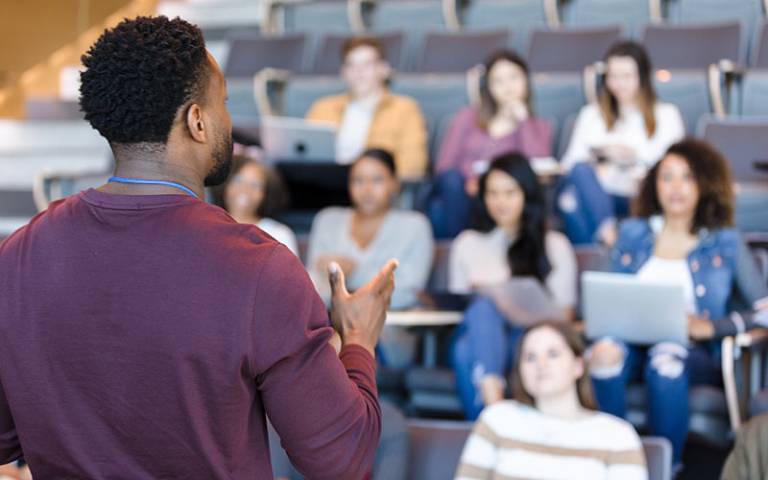Changing the conversation – new approaches to race awareness
Dr Vilaiwan Fernandes has worked to bring insightful training on race awareness to a wider audience.

6 December 2023
Vilaiwan, a Principal Research Fellow in Cell & Developmental Biology, Division of Biosciences, was inspired to work with React, a drama-based training group, to lead this initiative in the Faculty of Life Sciences after attending UCL Organisational Development's 'Inclusive Leadership: a conversation about race' workshop.
“One of the things I’ve seen is a lot of mentorship schemes created to address inequities,” Vilaiwan says. “They’re good schemes. But there’s often a lot of conversations about being less shy, being more assertive. Or a lot of conversations telling you how to find support, allies, and people to help you. All of that is useful. But it can also be exhausting, to always have to think, ‘I need to be more assertive because that’s the only way I can get ahead.’ Ultimately, you can’t address everything by working only with the minority. You also, at some point, have to train everyone else.”
Removing labels through inclusive creativity
At the OD workshop, the React facilitators enacted a conversation between two colleagues – a black employee and their white line manager.
After the scene had ended, the participants were invited to ask these ‘characters’ questions about their perceptions, their motivations and their interpretations of the conversation. The scene was then replayed, and the audience were invited to interrupt the performance, and offer suggestions to help facilitate the enacted conversation. By centring the analysis around two individuals, the theatre group made it possible to discuss sensitive issues without resorting to labels or categories.
Vilaiwan was surprised at the range of different opinions and mindsets that were revealed, saying: “I was surprised that many people after seeing the scene play out said, ‘this has nothing to do with race.’ It made me realise that people just often have a block. It’s not something personal, they just can’t see that these issues are related to race, or that other people might perceive it that way.
“The facilitators were really, really skilled. The conversation at one point nearly went completely off the rails, but they could guide it back really well. You didn’t have to define a microaggression, you didn’t have to define or use all these terms. It was just amazing to me that you could examine all these complicated race issues, without having to define anything.”
Vilaiwan was determined to find a way to bring React’s workshop to a wider audience within UCL: “A lot of what they were teaching didn’t necessarily apply just to racism. It was trying to teach line managers how to lead better."
Vilaiwan then spoke to Steve Wilson, the Vice-Dean for Research at the Faculty of Life Sciences. With his support, she successfully obtained funding from the Research Culture programme to run the workshop for the faculty.
Broadening the audience, tailoring the content, and maximising the impact
The pilot workshop, for staff in the Division of Biosciences, was built around the same drama-based training delivered for Inclusive Leadership by React – but with one important difference: “We worked with React to tell them about the kind of conversations and incidents that could occur in our division. With a bit of back and forth, they managed to create a scene that was more academic, or researcher specific.”
Over 40 members of staff attended the two Biosciences workshops, and unanimously fed back that the session had either ‘increased or greatly increased’ their confidence in navigating conversations about race.
90% reported ‘an improved understanding of issues related to race and racism in the workplace’, and 85% said they’d learned specific practices and tools to help them practise more inclusive leadership.
Based on the success of the initial pilot, the Inclusive Leadership and Race Awareness workshops were then made available to the entire Faculty of Life Sciences.
Embedding inclusive leadership at UCL
The enthusiastic response from all attendees, both at a divisional and a faculty level, should ensure that the workshops will continue, so that increasing numbers of UCL staff can benefit.
Vilaiwan hopes that these workshops were just the starting point, saying: “One piece of feedback that consistently came up was that this was the best workshop on this sort of topic that the attendees had taken, and that senior management and academics should be strongly encouraged to attend.”
There’s also been some interesting discussions about how elements of the workshop could be adapted to further the purpose of existing mentorship schemes for Black, Asian or minority ethnic individuals.
“There were a few people who’ve attended the workshops, with the goal of finding ways to talk more productively to their line managers about these issues," Vilaiwan says. “We realised that maybe there’s an unmet need there. Although some of this is already covered in terms of finding your allies, maybe parts of this could also be incorporated into the mentorship schemes to provide advice on broaching these topics with line managers.
“I think ultimately, though, these issues are better solved by managers being more receptive to conversations that could get uncomfortable. If we want to improve research culture – for whatever group or category – people need to do the work, and make the time to do that work.”
“"If we want to improve research culture - for whatever group or category - people need to do the work, and make the time to do that work."
- Dr Vilaiwan Fernandes, Senior Research Fellow in Cell & Developmental Biology, Division of Biosciences, Faculty of Life Sciences
More information
About research culture
UCL’s Research Culture programme is developing a fair, collaborative and inclusive research culture, where both our research and research community can thrive. We work with UCL’s research community to support and deliver change against our 10-year Research Culture Roadmap.
 Close
Close

